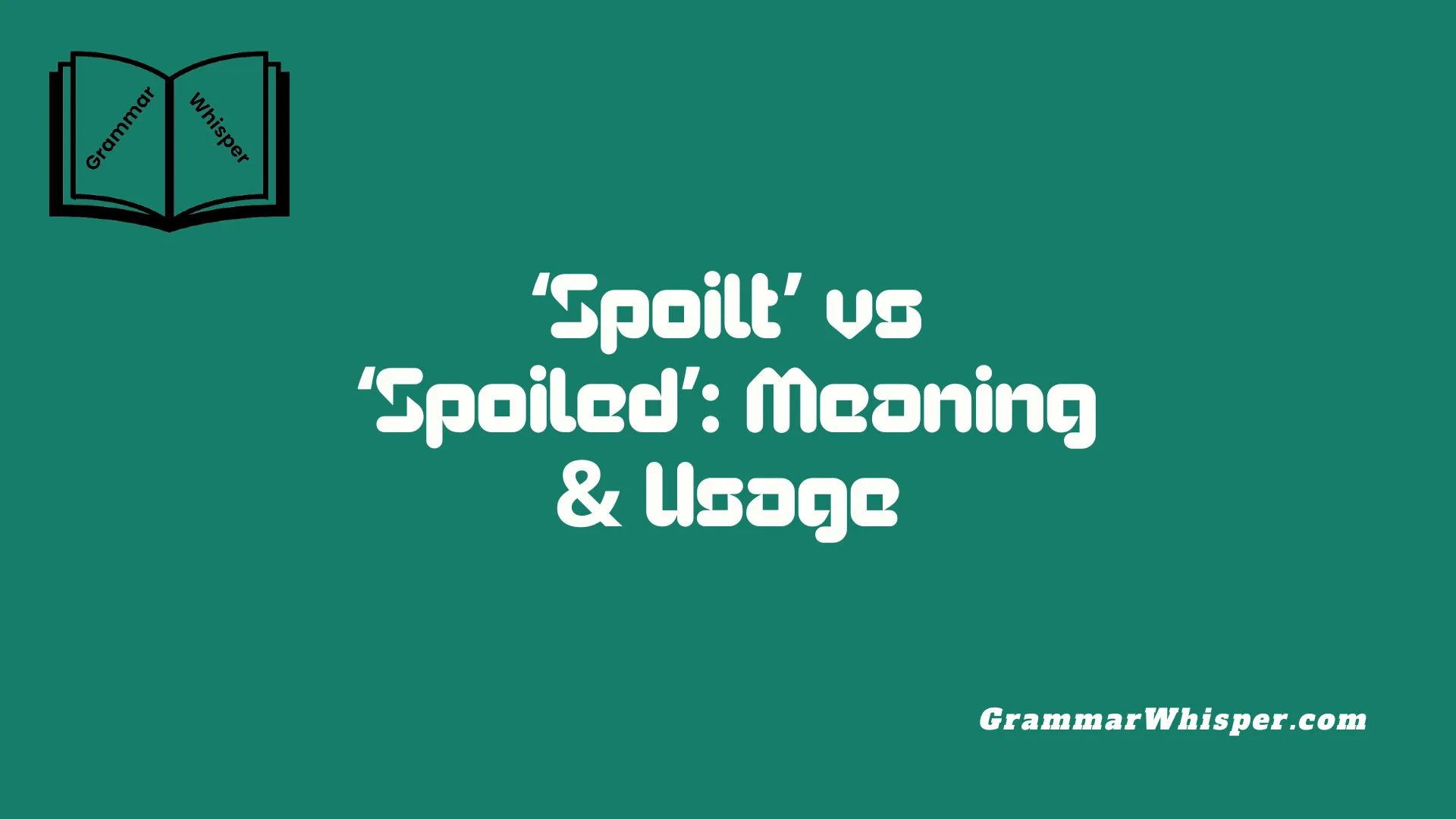In my writing career, I quickly ran into confusion over choosing between Spoilt’ vs ‘Spoiled. They mean the same, but depending on region, the preferred word can shift. These twin versions of the same term often trip up even experienced writers. If you’re unsure about the right form, especially when dealing with American or British dialects, you’re not alone. The subtle differences between the two carry cultural and regional weight. What might seem like a minor spelling tweak could dramatically shape how your audience perceives your message. In the UK, “spoilt” is more commonly used, whereas in the US, “spoiled” clearly dominates in both casual and formal usage.
This article exists to give you practical guidance for making the best decision in real-world scenarios. Take my experience with crafting an editorial for a British outlet – I opted for “spoilt child” because it felt more at home in that linguistic context. Contrast that with a recent project we geared toward an American audience, where we leaned into “spoiled brat” to better match the tone and flavor of that market. These aren’t merely cosmetic choices in spelling. They reflect deeper grammatical, historical origins of English words. The debates over correctness aren’t just academic. They come from how the language has evolved, and how writers must apply their understanding of these spellings across various forms of communication. There’s no single universal answer – just the best choice for your target readers.
Tracing the Origins: Spoiled or Spoilt?
The debate over “spoilt” vs. “spoiled” is rooted in the history of the English language itself. Both words originate from the verb spoil, which has roots in Latin and Old French. The term spoliare, meaning “to strip” or “to despoil,” gradually evolved in English to mean “to damage, ruin, or decay.” Over the centuries, spoil gave rise to two variants in past tense and past participle forms: “spoiled” and “spoilt.”
Historical Evolution
- Old French Influence: The word spoil made its way into Middle English via Old French espoillier, which, over time, produced both the regular form (“spoiled”) and the irregular form (“spoilt”).
- Early Usage: In early English, both forms were used interchangeably. However, over the centuries, regional dialects began to favor one form over the other. The British preferred “spoilt,” while American English leaned toward “spoiled.”
A Quick Word About Regional Usage
- British English: Both “spoilt” and “spoiled” are commonly used, though “spoilt” is more prevalent in certain contexts, especially in literary or poetic forms.
- American English: “Spoiled” has become the preferred form for both past tense and past participle in all contexts, including casual and formal writing.
British English vs American English: The Regional Divide
The primary difference between “spoiled” and “spoilt” lies in their regional preferences. Understanding these regional preferences is crucial for maintaining clarity and consistency in your writing.
Why British English Uses Both “Spoilt” and “Spoiled”
In British English, there is no strict rule against using either form. You’ll often see “spoilt” used in literature, especially in older works, or in more formal contexts. The use of “spoilt” gives a sense of tradition or literary flair. This makes sense since British English tends to preserve older forms and structures longer than American English.
Why American English Prefers “Spoiled”
In the United States, “spoiled” has become the standard form across all types of writing. Whether it’s a newspaper article, a novel, or a piece of academic writing, “spoiled” reigns supreme. The United States has consistently favored regular verbs in past tense and past participle forms, and “spoiled” fits neatly within this trend.
Cultural Influence and Shifts in Usage
- American Culture: Over time, the American preference for “spoiled” aligns with the country’s general trend of adopting more streamlined language practices. Additionally, US media and advertising have reinforced the usage of “spoiled,” further solidifying its place in the collective American vocabulary.
How Language Shifts Over Time
Language evolves, and this shift is not necessarily due to an official rule. Rather, it’s the result of cultural, social, and commercial influences. In America, for example, the trend toward simplifying and regularizing verbs has impacted not only “spoiled” but many other words (e.g., “learned” vs. “learnt,” “burned” vs. “burnt”).
Grammar Breakdown: Past Tense vs Past Participle
Both “spoiled” and “spoilt” function as past tense and past participles of the verb spoil. However, their usage depends on the context and the region.
Regular vs. Irregular Forms
- “Spoiled” is a regular verb form, meaning it follows the common pattern of adding -ed to the base verb in the past tense and past participle.
- “Spoilt” is an irregular form, which is a holdover from earlier English usage. Irregular forms were once the norm, but regular verbs became more common in modern English.
Examples in Sentences
- “Spoiled”: “The milk spoiled after being left out too long.”
- “Spoilt”: “The child was a spoilt brat.”
Interestingly, although “spoilt” may seem more formal or literary, it is grammatically correct in both British and American English, but American English prefers “spoiled” universally.
Irregular vs Regular Verbs in Other Examples
- Dream → Dreamt (irregular) vs Dreamed (regular)
- Burn → Burnt (irregular) vs Burned (regular)
- Learn → Learnt (irregular) vs Learned (regular)
Connotation & Cultural Usage: Are They Always Interchangeable?
One of the most significant aspects of understanding “spoilt” vs. “spoiled” is realizing that they aren’t always interchangeable – even within the same language.
“Spoiled” in Emotional and Behavioral Contexts
In American English, when you say someone is “spoiled,” it often has a negative connotation, particularly referring to children who are overindulged and lack discipline. It suggests entitlement and a lack of proper upbringing.
“Spoilt” in British and Literary Usage
In contrast, “spoilt” tends to carry less negative baggage in British English and can sometimes have a more poetic or formal tone. For example, in literature, you might read, “The spoilt heir to the throne,” but the same context in American English would likely use “spoiled.”
Media, Literature & Pop Culture Examples
Let’s explore how each form is represented in various media.
American Media: Dominance of “Spoiled”
In American pop culture, the word “spoiled” is ubiquitous. It appears in:
- Parenting guides: “Don’t let your child get spoiled.”
- Reality TV shows: “She’s a spoiled millionaire.”
- News and films: “The spoiled princess demands more.”
British Media: Use of “Spoilt”
In British media, “spoilt” is often used in more formal contexts, especially in:
- Literature: “The spoilt aristocrat.”
- Historical dramas: “The spoilt prince.”
- UK newspapers: “The spoilt rich kids of London.”
Pop Culture Comparison
- American film: “The Spoiled Girl” – a film title reflecting common use of “spoiled.”
- British TV: “Spoilt for Choice” – a phrase commonly used in the UK, demonstrating a more formal tone with “spoilt.”
Search Data & Usage Trends: Which One Do People Use More?
A quick search reveals how these two words are used differently around the world.
Google Trends Comparison
- United States: “Spoiled” appears in 90% of searches related to this term.
- United Kingdom: Both “spoilt” and “spoiled” appear in approximately 50% of searches each.
- Australia: Similar to the UK, “spoilt” is more commonly used in formal writing, but “spoiled” is dominant in everyday language.
Corpus Linguistics Data
- COCA (Corpus of Contemporary American English): Overwhelmingly favors “spoiled.”
- BNC (British National Corpus): Shows a more balanced use of both “spoilt” and “spoiled.”
Practical Usage Guide: When to Use ‘Spoiled’ or ‘Spoilt’
Knowing when to use “spoilt” and “spoiled” comes down to context, tone, and audience. Here’s a quick reference guide:
| Context | Preferred Form |
| American English | Spoiled |
| British English | Spoilt (formal/literary) |
| General Writing | Spoiled |
| Historical or Poetic Tone | Spoilt |
| Child Behavior Context | Spoiled |
Common Mistakes & Misconceptions
There are a few misconceptions about “spoilt” and “spoiled” that lead to common mistakes:
- Misconception: “Spoilt” is an outdated form. Fact: It’s still used in British English, especially in formal writing.
- Mistake: Confusing the past tense and past participle usage. Fact: Both “spoiled” and “spoilt” can function as past tense and past participles.
Conclusion
In the end, both “spoilt” and “spoiled” are correct, but the form you use depends on the dialect you’re writing in and the tone you wish to convey. When in doubt, remember:
- Use “spoiled” for American audiences and most modern contexts.
- Use “spoilt” for British audiences and more formal, literary contexts.
FAQs
Is ‘spoilt’ grammatically incorrect in American English?
No, it’s just rare and old-fashioned.
Can I use ‘spoiled’ and ‘spoilt’ interchangeably in the UK?
Yes, but “spoilt” is preferred in more formal contexts.
Is one version more accepted in academic writing?
“Spoiled” is favored in most academic and professional writing, globally.
Which is more commonly used online?
“Spoiled” dominates online due to US influence.
What’s the best rule of thumb for choosing between them?
Match your choice to your audience and context.











